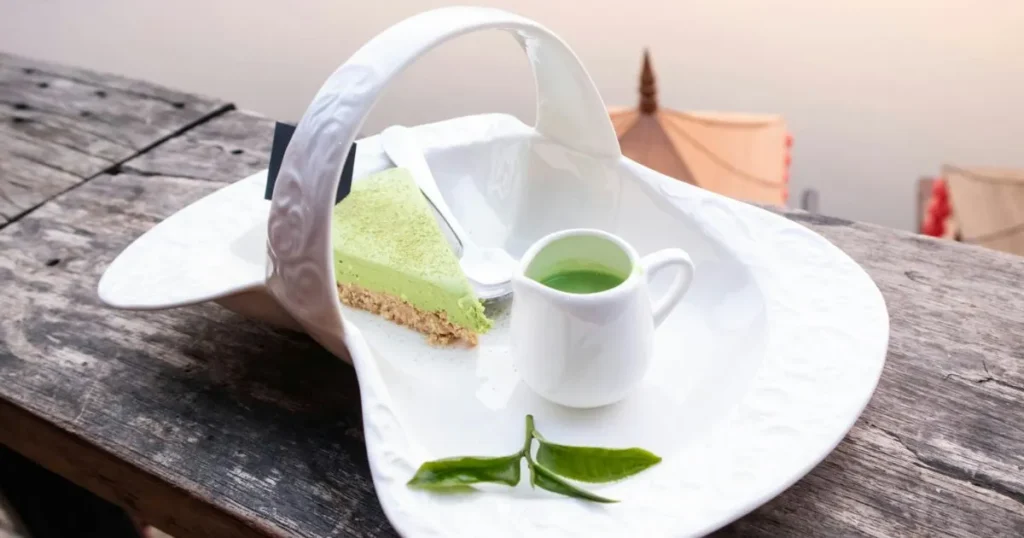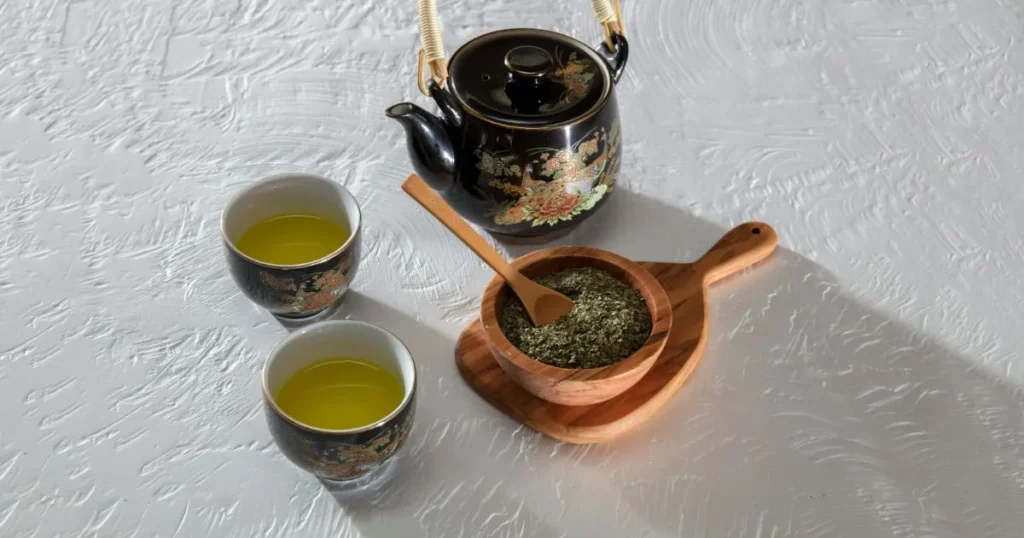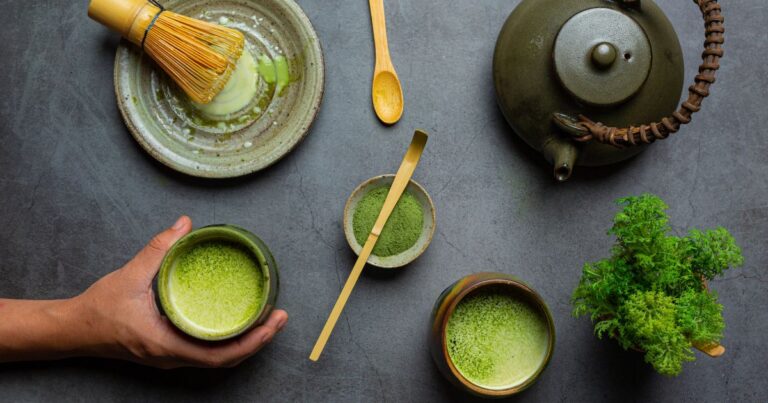5 benefits of japanese green tea
If you’ve ever wondered why Japanese green tea is often considered the gold standard in the tea world, you’re not alone. Renowned for its bold, earthy taste and a rich history that dates back centuries, Japanese green tea has captivated tea lovers around the world. More than just a beverage, it’s a reflection of a lifestyle centered on well-being, tradition, and mindfulness. Whether you’re aiming to enhance your energy, support your health, or indulge in something extraordinary, Japanese green tea offers the perfect blend of benefits and flavor for every tea enthusiast.her you’re looking to boost your energy, improve your health, or simply savor something unique, Japanese green tea might be the perfect choice for you. Let’s explore the five key benefits of Japanese green tea and why it’s a cut above the rest.
Table of Contents
What Makes Japanese Green Tea Unique?
Japanese green tea stands out in the world of tea for a variety of reasons. The country’s cultivation and processing methods are designed to preserve the integrity of the leaves, giving you a product that’s fresh, vibrant, and full of flavor. Unlike other types of green tea, Japanese teas are typically grown in shaded conditions, which enhances their flavor and nutrient content. Now, let’s dive deeper into what sets it apart.
The Growing Process
One of the key differences between Japanese green tea and other teas is the method of cultivation. Japanese green tea is grown in cooler, high-altitude regions with natural shade, especially in areas like Uji and Kagoshima. This growing process increases the chlorophyll content, resulting in a deeper, more vibrant green color.
The Taste
Japanese green tea has a distinct umami flavor that sets it apart. The careful harvesting process ensures that the leaves retain their natural sweetness, balanced with a mild bitterness. Whether you enjoy the creamy texture of Matcha or the fresh taste of Sencha, Japanese green tea offers a flavor profile you won’t find anywhere else.
High Nutrient Content
Because Japanese green tea is grown and processed with the utmost care, it’s packed with more vitamins, minerals, and antioxidants than other varieties. This makes it not only delicious but also incredibly beneficial for your health.
5 Proven Health Benefits of Japanese Green Tea

Now that you understand what makes Japanese green tea special, let’s dive into the five key health benefits you can expect when you make it a regular part of your routine.
1. Rich in Antioxidants for Better Health
Japanese green tea is packed with antioxidants, particularly catechins, which are compounds that help neutralize harmful free radicals in your body. The most potent antioxidant found in Japanese green tea is Epigallocatechin gallate (EGCG), which is known for its potential to reduce oxidative stress, slow down aging, and prevent chronic diseases.
How it helps:
- Helps safeguard your cells from the harmful effects of free radicals.
- Could potentially lower the risk of conditions like heart disease and cancer.
- Improves skin health by preventing wrinkles and fine lines.
Did you know? Studies have shown that regular consumption of green tea can lower your risk of developing certain types of cancer, including breast and prostate cancer. The antioxidants in this type tea help prevent cell damage, giving you an extra layer of protection.
2. Boosts Metabolism and Aids in Weight Loss
Seeking a natural way to kickstart your metabolism? Japanese green tea might be the answer. The combination of caffeine and catechins, especially EGCG, works together to speed up fat-burning processes and increase calorie expenditure. When paired with a balanced diet and regular exercise, this can contribute to more efficient weight management.
How it helps:
- Increases fat oxidation and boosts metabolism.
- It can help promote fat loss, particularly around the abdominal area.
- Aids in regulating blood sugar levels, helping to curb cravings.
Studies indicate that drinking Japanese green tea can significantly help with fat loss. In one study, participants who consumed green tea extract burned more fat than those who didn’t.
3. Improves Brain Function and Mental Clarity
Japanese tea contains caffeine, but it’s not the same as the jittery effect you might experience from coffee. That’s because it also contains an amino acid called L-theanine, which promotes relaxation and helps you focus without the crash. The combination of caffeine and L-theanine works in synergy to improve brain function and mental clarity.
How it helps:
- Improves focus, attention, and memory.
- Provides a calm yet alert feeling.
- Reduces anxiety and stress levels.
Tip: Try a cup of Matcha before tackling a big project or preparing for an important meeting. The caffeine from the Matcha, combined with L-theanine, will keep you sharp and calm.
4. Supports Heart Health
green tea is often hailed as a heart-healthy beverage, thanks to its ability to lower cholesterol, improve blood circulation, and reduce blood pressure. Studies have shown that regular consumption of green tea can help protect against heart disease and improve overall cardiovascular health.
How it helps:
- Lowers LDL (bad) cholesterol levels.
- Enhances circulation and lowers the risk of blood clotting.
- May help reduce high blood pressure.
Data: A study conducted by the American Journal of Clinical Nutrition found that people who drank green tea had a 31% lower risk of developing heart disease compared to those who didn’t.
5. Enhances Immunity and Fights Inflammation
Japanese green tea contains compounds that help boost your immune system, making it easier for your body to fight off infections. The polyphenols in green tea also have powerful anti-inflammatory properties, which can help reduce chronic inflammation in your body.
How it helps:
- Strengthens your immune system.
- Helps alleviate the severity of cold and flu symptoms.Helps fight inflammation in the body.
Bonus Benefit: Research indicates that the antioxidants in this tea can also help regulate inflammatory markers, which may reduce the risk of inflammatory diseases like arthritis.
Why Japanese Green Tea is Better Than Other Teas

While all green teas have their benefits,It offers superior health advantages. Let’s compare why Japanese green tea stands out from the crowd.
Unique Growing Methods and Superior Taste
The cultivation methods in Japan are one of the main reasons why Japanese green tea tastes so unique. Unlike teas from other regions, is often grown in shaded areas, allowing the leaves to accumulate more nutrients. This results in a deeper, richer flavor and higher antioxidant content.
Higher Nutrient Content
It contains more vitamins, minerals, and antioxidants compared to green teas from other regions. These nutrients are retained during the production process, which includes steaming the leaves rather than the pan-frying method used in other parts of the world.
Sustainability and Quality Control
Japan is known for its commitment to quality and sustainability. Many Japanese tea farms use organic farming practices, ensuring that the tea you drink is free of harmful chemicals and pesticides. The strict quality control measures in place ensure that you’re getting the best tea possible.
How to Incorporate Japanese Green Tea Into Your Daily Routine
Now that you know the benefits, you’re probably wondering how to incorporate Japanese tea into your daily routine. It’s easier than you think!
Simple Ways to Enjoy Japanese Green Tea
- Morning: Kickstart your day with a cup of Matcha to awaken both your body and mind.
- Afternoon: Enjoy a refreshing cup of Sencha to keep you going through the afternoon slump.
- Evening: Wind down with a calming cup of Gyokuro to promote relaxation before bed.
Delicious Japanese Green Tea Recipes
If you want to elevate your tea experience, here are a few simple recipes to try:
Matcha Latte
- 1 teaspoon Matcha powder
- 1 cup milk (or dairy-free alternative)
- 1 tablespoon of honey or your preferred sweetener
Instructions: Whisk the Matcha powder into hot water until smooth. Heat your milk and froth it, then pour over the Matcha. Sweeten to taste.
Iced Sencha
- 2 teaspoons Sencha leaves
- 1 cup cold water
- Ice cubes
Instructions: Steep the Sencha leaves in hot water for 2-3 minutes, then cool it down with ice cubes for a refreshing iced tea.
Frequently Asked Questions About Japanese Green Tea
Q1: What makes Japanese green tea different from other green teas?
Japanese tea is unique because it’s grown in shaded conditions, which enhances its flavor and nutrient content. It’s also processed differently, preserving its natural antioxidants and rich flavor.
Q2: Can Japanese green tea help with weight loss?
Yes, the catechins in Japanese green tea have been shown to boost metabolism and help with fat loss, especially around the abdominal area.
Q3: How much Japanese green tea should I drink daily?
For maximum health benefits, try to drink 2-3 cups of Japanese green tea daily. This amount has been shown to support heart health, boost metabolism, and improve overall well-being.
Q4: Is it better to drink Japanese green tea hot or cold?
Both! Enjoy Japanese tea hot in the morning for a soothing start or chilled in the afternoon for a refreshing lift.
Conclusion
Japanese green tea isn’t just a drink—it’s a gateway to better health, increased energy, and a more mindful lifestyle. With its numerous health benefits, unique taste, and rich cultural history, it’s no wonder that Japanese green tea is favored by tea enthusiasts around the world. Now that you understand the 5 key benefits and why it’s better than other teas, why not incorporate it into your daily routine? Make the change today and experience the transformative power of Japanese tea for yourself!
Ready to try Japanese green tea? Explore TeaForWorld.com to find a curated selection of premium teas that cater to both your taste and health goals.



